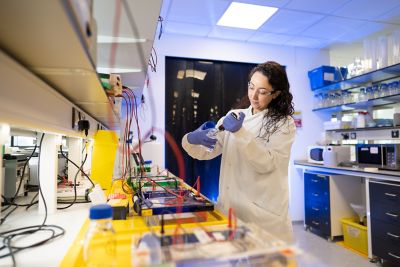
Are you fascinated by the molecular fundamentals of life and the chemical processes occurring in living organisms? Do you want practical experience from the very beginning of your training? If so, the University of Nottingham could be the ideal place to take on your Biochemistry degree.
With practical experience from the beginning of your degree, you will be taught by scientists who are leaders in the fields of biochemistry and the molecular basis of disease. Our teaching will ensure you graduate with the core skills needed to be successful in your future profession with potential careers from laboratory scientist to data analyst, patent law and teaching.
So what happens in a typical Biochemistry lab class? Here's an in-depth look into an enzyme kinetics practical session. Take a peek as Dr. Claire Friel and Dr. Timothy Simpson walk us through, with some of our current students sharing their experiences.
In our Biochemistry course, you'll learn from leading scientists in the molecular basis of disease, including Professor Rob Layfield who is a leader in the study of ancient proteins (paeloproteomics). Recently, Rob has been investigating a bone deformation disease known as Paget’s, in the remains of monks.
You’ll also learn from Dr. Sebastien Serres, who is developing a cutting-edge metabolic imaging method known as Dynamic Nuclear Polarisation 13C Magnetic Resonance Spectroscopy. Sebastien is using this technique to study changes associated with brain function in health and disease.
During your degree, you will learn how the regulation of gene expression and protein function controls every aspect of cell behaviour, ranging from cell division and cancer to cellular metabolism, obesity, and neurodegenerative disease. You’ll be able to tap into this expertise and more, and graduate with the skills needed to be successful in your future profession, wherever that leads you.
What our students say...

The labs are way more fun than in school, they feel like real science, and it's interesting to see how scientists are actually discovering and developing solutions and understanding what's going on biochemically.
Kieron
Year two Biochemistry BSc student

It's very sociable being here, the lectures are very engaging. Likewise with the practicals; you get the support that you need. As long as you get stuck in and put your foot forward to do the work, there's plenty of stuff to do here.
Ben
Year two Biochemistry BSc student



